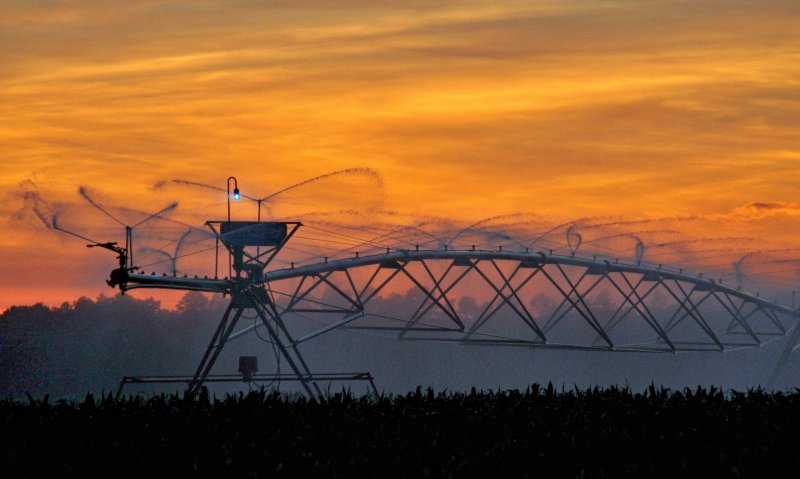10-month state drought warning lifted after rains replenish groundwater
While the statewide drought watch was lifted after 10 months Aug. 18, some farmers are still looking to the skies for steady rain to help them through the end of the growing season.
Many farmers in the state, especially in Sussex County with its sandy soil, rely heavily on irrigation to draw water from an abundant aquifer, said farmer Jay Baxter of Georgetown. That got them through the drought, he said.
“Last year, we virtually grew a corn crop from irrigation water,” Baxter said.
“We’ve actually made out very well in this area this summer,” he said after working into the night Aug. 26 on his irrigation system. “That doesn’t stop the farmer from working extra hard to keep irrigation running.”
The effects of the drought were more significant in the western side of Sussex County, said Baxter, a member of the Sussex County Farm Bureau board of directors.
While the drought warning was lifted statewide by Gov. Matt Meyer, there is still cause for concern among many farmers, said Jim Minner, president of the Kent County Farm Bureau.
“We need some rain soon,” Minner said. “Some areas don’t have irrigation.”
He said he has no irrigation for his grain crops, and the soybeans have begun to burn, roll up and look gray. Some steady rain showers could give a boost at this critical time near the end of the growing season.
While groundwater levels have reached an acceptable level, prompting the state to lift the drought warning, water levels in farm ponds are low and ditches that usually have water this time of year are dry, Minner said.
Last year’s drought took a heavy toll on some farms’ crop production, but there has been some recovery this year, he said.
The price farmers receive for some crops has declined to below the levels needed to break even, and rain could increase yields and help farmers close the financial gap, Minner said.
The lingering drought late last year taxed groundwater supplies but did not necessitate a water usage advisory, said David Baird, district coordinator of the Sussex Conservation District.
“Last fall going into last winter was very dry and impacted groundwater supplies,” Baird said.
No municipal or private water systems informed him of any problems caused by the drought, he said.
Recent rainfall comes at a good time, as it recharged the aquifer and provided water for crops at a time when they needed it, he said.
“There are still crops not ready for harvest, and they need moisture to finish growing,” he said, noting those include corn and soybeans.
“The biggest thing now is, this is the time when things dry and get ready for harvest,” Baird said.
Meyer lifted Delaware’s drought watch after recommendations from the state Water Supply Coordinating Council and the Governor’s Drought Response Committee, according to a news release issued Aug. 18 by his office.
“Lifting the drought watch is welcome news after nearly a year of dry conditions, and I want to thank every Delawarean who did their part to conserve water,” Meyer said. “With rainfall returning to normal, our state is in a much stronger position heading into the fall. While water conditions have improved, we should carry forward the lesson that water is one of our most precious natural resources, and it’s up to all of us to use it wisely.”
The drought watch was declared by then-Gov. John Carney in late October 2024, when the state’s reservoirs and water supplies typically get a recharge after heavy spring and summer use, according to the recent news release.
Six straight months of below-normal precipitation led to the drought watch, which continued as rainfall was below average for much of the state during the first half of the year.
After months of above-average rainfall – which continued into June and was topped by frequent thunderstorms and weeks of almost nightly rainfall in July – the council convened and voted to recommend that Meyer lift the drought watch.
Rainfall for July was almost 5.2 inches, an inch above normal for the state at that time of year, the Water Supply Coordinating Council noted.
“Last year, we got hit hard,” Minner said. “Our crops look really good this year. We just need some rain showers.”
Kevin Conlon came to the Cape Gazette with nearly 40 years of newspaper experience since graduating from St. Bonaventure University in New York with a bachelor's degree in mass communication. He reports on Sussex County government and other assignments as needed.
His career spans working as a reporter and editor at daily newspapers in upstate New York, including The Daily Gazette in Schenectady. He comes to the Cape Gazette from the Cortland Standard, where he was an editor for more than 25 years, and in recent years also contributed as a columnist and opinion page writer. He and his staff won regional and state writing awards.
Conlon was relocating to Lewes when he came across an advertisement for a reporter job at the Cape Gazette, and the decision to pursue it paid off. His new position gives him an opportunity to stay in a career that he loves, covering local news for an independently owned newspaper.
Conlon is the father of seven children and grandfather to two young boys. In his spare time, he trains for and competes in triathlons and other races. Now settling into the Cape Region, he is searching out hilly trails and roads with wide shoulders. He is a fan of St. Bonaventure sports, especially rugby and basketball, as well as following the Mets, Steelers and Celtics.






















































